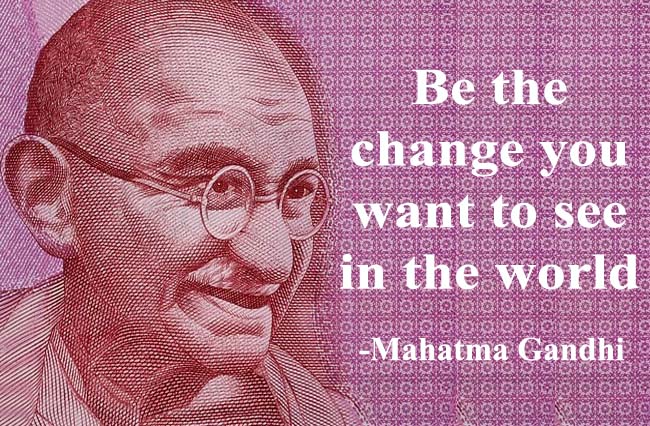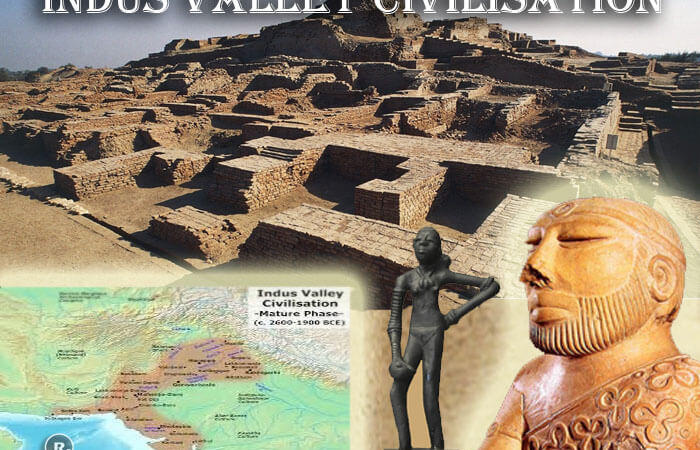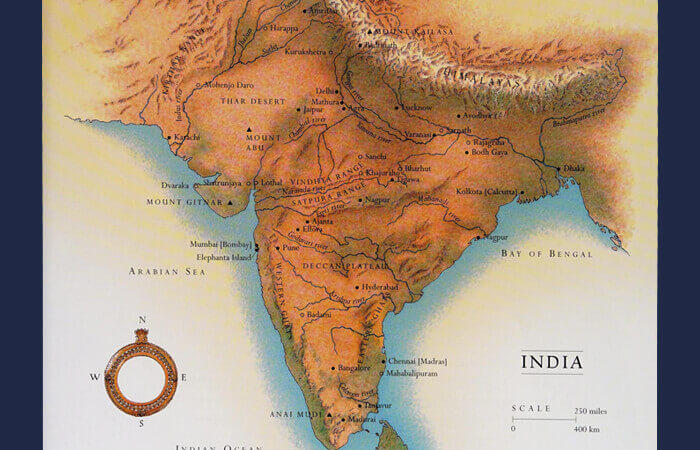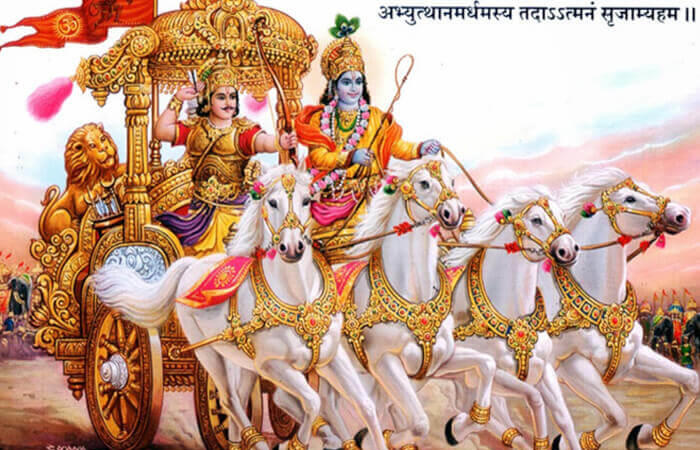The Influence Of Gandhiji

Gandhiji has influenced many people all over the world, Martin Luther King, Nelson Mandela, Albert Einstein have acknowledged Gandhi as a guiding light for his vision of nonviolence. Gandhi proved that one man has the power to take on an empire, using both ethics and intelligence.
Mahatma Gandhi was an important man in India, who influenced much of the country. He was born and raised in a Hindu family in coastal Gujarat, Western India. At the age of thirteen, Gandhi entered his arranged marriage and a few years later went to attend law school in London. In 1893, he became an attorney in South Africa, where he first practiced passive resistance against the British law enforcers who oppressed the Indian race. In 1915 after Gandhi had made Indians live better in South Africa, he went back to India to begin his struggle for independence from the British.
Gandhi helped India to gain independence on August 15, 1947. Gandhi had to get through many tough obstacles to be such an influential leader both in South Africa and India. Some obstacles were violence, religious persecution, racism, and discrimination of the castes. Gandhi opposed these things in order to attain the freedom of both countries. “To deprive a man of his natural liberty and to deny him the ordinary amenities of life is worse than starving the body, it is starvation of the soul, the dweller in the body,” this quote is an example of how Gandhi firmly believed in freedom and equality for people. Gandhi believed his main obstacle in life was to end discrimination towards everyone.
South Africa was one stage in Gandhi’s life in which he tried to end racial persecution. Being thrown off a train when he sat in the first-class section, was the first time that Gandhi experienced racial persecution there. After his realization that the Europeans in South Africa did not want Indians to be in a high-status position, Gandhi tried to oppose them. He did this by burning his “pass” that was issued only to the non-Europeans.
Other Indians immediately followed his even though it was against the law. This event was the first of many times that Gandhi used passive resistance to illustrate a point. He set up meetings for Indians to gather and protest non-violently. Even in his young years, Gandhi believed that all people should be treated the same and learn to love each other. “In nature, there is fundamental unity running through all the diversity we see about us.”
Suggested Read: Gandhi Jayanti
Gandhi was arrested after burning his pass but it was a small price to pay when the British finally changed the pass law. However, new laws were passed that enabled the British to enter Indian homes when they choose and made each Indian have their fingerprints taken.
Gandhi had been called a “Sammy”, a “coon”, and a “coolie”, which were derogatory Indian names, yet he still set an example not by fighting or trying to get them back, but by refusing to give his fingerprints. Other Indians follow his in order to protect their rights as citizens, which caused them to get thrown in jail.
The Indian mineworkers boycotted their jobs in order to free the people in jail, and sure enough, Gandhi and all the other prisoners got set free. The oppressive laws got changed and Gandhi became satisfied with the improvements in South Africa. He radically changed the Indian’s lives and most of the discrimination that used to exist in South Africa even though it presented to his many problems.
Gandhi lived in South Africa for about twenty-two years, but when the oppressive laws were changed, he made his way back to his home country, India. It has been a long time since he had lived in India and upon arrival, he dressed as a commoner and was greeted by thousands of people. Gandhi immediately becomes a part of Indian politics and his opinion has a great effect on most of the country.
Gandhi tried to include the poverty-stricken people in classifying India. He realized their needs and made efforts to help them financially. Gandhi reached out to the inferior castes and began his fight to end discrimination and British control of India. Gandhi once said, “just as a man would not cherish living in a body other than his own, so do nations not like to live under other nations, however noble and great the latter maybe.” Passive resistance is still Gandhi’s approach to gaining freedom from the British and stopping violence in India but discrimination keeps getting in the way. Judging people by their religion or color of skin leads to violence and oppression which are problems in India.
Suggested Read: Mahatma Gandhi Quotes
Gandhi was put in prison many times in his lifetime because of his push for Indian independence. Muslim-Hindu hostility was ended shortly when Gandhi tried to unite the two religious groups by fasting until they stopped the violence against each other. He wanted the British to end their rule in India, and for the Muslims and Hindus to cooperate with each other in the independence of India. India was granted its independence on August 15, 1947, however, Pakistan was also made a separate state much to Gandhi’s dismay. Gandhi wanted the two religions to accept each other’s differences and learn to live together without separating.
When India gained independence from the British in 1947, it became a Hindu state and Pakistan an Islamic state. About seventeen million people left their homes to move to one of the countries, based on their religion. There were a million deaths, including Gandhi’s in the next six months. Gandhi was killed in January of 1948, by a Hindu extremist who did not want him to favor Muslims. Nehru became Prime Minister of India and from 1947 to 1949, India and Pakistan conflicted. India still contained many poor people and small wars still occurred. Nehru’s daughter, Indira Gandhi became the Prime Minister in January 1980.
Her father death occurred in 1964 and a number of successors ruled until her rule. In the early eighties, Sikh violence became prominent and they killed Indira Gandhi after which Rajiv Gandhi became the Prime Minister. However, violence still persisted from the Sikhs and Kashmiri Muslims and other groups wanted more independence. The old nationalism ideas started to deflate, and India has more separation in religion, the caste system, than in the neighborhood. Rajiv Gandhi resigned as Prime Minister in 1989 and was killed in 1991. The new leader. Shankar Dayal Sharma became president in 1992 and soon after, the worst violence since India’s freedom began. In 1996, many of India’s leaders were charged with taking bribes for things in return. India’s government and overall society have gone down ever since Gandhi died in 1948.
Also Read: Why Nathuram Godse Killed Mahatma Gandhi
“My work will be finished if I succeed in carrying conviction to the human family, that every man or woman, however weak in body, is the guardian of his or self self-respect and liberty, and that this defense prevails...” Gandhi once said. Gandhi’s goal was to make everyone equal and equally free. He wanted to unite not only Indian people but also everyone in the world. His personal goal is to succeed in making oppression go away for every man and woman.
Gandhi did not succeed according to his particular goals. However, there is not a possible way to succeed with standards that are set so high. Gandhi really pushed himself to be the best person he could be, “the only virtue I want to claim is truth and non-violence. I lay no claim to superhuman powers… you must be the change you wish to see in the world.”
Gandhi was successful in many ways, but not in the way he was hoping for. He did not want Pakistan to become its own state and was hoping the Hindus and Muslims would get along. The violence in India only got worse after he died and Indian society is discriminatory once again. Gandhi has a wonderful effect on people during most of his lifetime, but after he was gone, there was little done to preserve the culture that he molded so finely together. Gandhi was unsuccessful according to his own standards, and his hopes of changing world culture.
Suggested Read: Mahatma Gandhi – 150th Birth Anniversary






